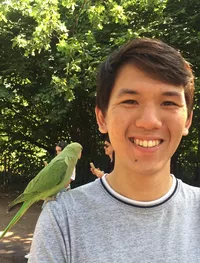Dr. Brandon Mak

Chair for Terrestrial Ecology
Department for Life Science Systems
TUM School of Life Sciences
Technische Universität München
Hans-Carl-von-Carlowitz-Platz 2
D-85350 Freising-Weihenstephan
Room: 1.1.2.3
Phone: +49.8161.71.3713
Fax: +49.8161.71.4427
E-mail: brandon.mak[at]tum.de
Curriculum vitae
| 2024- | present | Postdoctoral researcher at Chair for Terrestrial Ecology, Technische Universität München, Germany |
|---|---|---|
| 2019- | 2023 | PhD in Geography, King’s College London, UK |
| 2017- | 2018 | MSc Sustainable Cities, King’s College London, UK |
| 2015- | 2017 | Master of Architecture, University of Edinburgh, UK |
| 2012- | 2017 | Bachelor of Arts (Architecture), University of Edinburgh, UK |
Research interest
Drawing from his background in Architecture and Geography, Brandon’s research intersects the environmental and social sciences to understand how human and nonhuman animals share urban landscapes. Through his work he has conducted empirical research surrounding peregrine falcons, pigeons and barn owls, focusing on human-animal interactions and their consequences for wildlife and society. He is knowledgeable on the (ecological) success of urban raptors, especially peregrines, and the politics behind their conservation in cities.
Brandon is currently interested in topics related to urban ecology and is particularly keen on human-wildlife conflict and coexistence, (biological) pest control and disease ecology. He encourages the exploration of quirky research questions and has a soft spot for pigeons, the “rats with wings”.